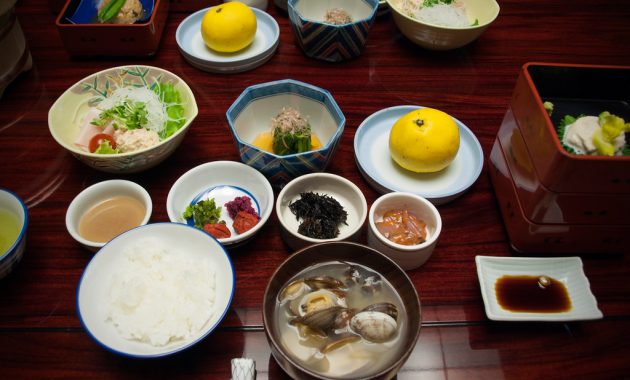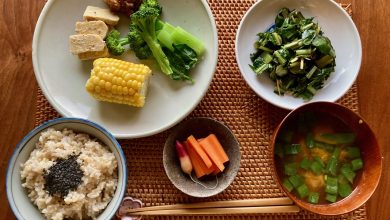Everything you want to know about traditional Japanese breakfast and where to find it in Moscow
Traditions in Japan are given special attention, whether it is bathing in hot springs, the culture of communication or eating. Breakfasts are no exception. We talked to Kobayashi Katsuhiko, a chef from Tokyo who has been eating Japanese morning meals since childhood and now cooks them in Moscow.
As a child, my mother cooked a traditional breakfast for me every day. The base was always rice and homemade miso soup, and they were served with various vegetable starters, scrambled eggs, sausages and fish. Now it’s hard to remember exactly what snacks were made, and, to be honest, I was in a bad mood in the mornings and didn’t concentrate on the details. But I can definitely say that the main components of a Japanese breakfast have always been on the table.
At Izumi, I wanted to make a simple morning snack, the kind that I myself ate at home while living in Japan. We also added vegetable starters and desserts to the main courses. Now in Moscow it is not easy to find good inexpensive fish, and suppliers no longer deliver many Japanese products to Russia at all. So far, we manage to comply with all the necessary conditions for cooking: some products can be replaced, some are in stock, but what will happen next is not clear.
What does a traditional Japanese breakfast consist of?
The traditional breakfast in Japan is prepared according to the principle of ichiju sansai, which means one soup, three courses. Most often, breakfast includes miso soup, a bowl of steamed rice, a hot dish – usually a salmon steak – and pickles, which are called tsukemono. These may include pickled vegetables, fruits, or sprouts such as daikon, vegetable chrysanthemum flowers, plums, eggplant with shiso leaves, shallots, and other fermented foods. Various snacks are added to this base in small separate plates – Japanese tamagoyaki omelet, tofu, onsen-tamago egg, spinach in broth, natto beans and various stewed vegetables.
How to prepare a traditional breakfast at home?
Cooking a traditional Japanese breakfast at home is not that difficult. I recommend taking round-grain rice and cooking it in a rice cooker – it should turn out elastic and not boiled. You can make your own miso soup, but for this you need to buy Japanese miso paste and seaweed and cook fish broth. If you don’t feel like going so deep, you can buy ready-made miso soup in bags, most importantly, don’t take the cheapest options and look at the manufacturer’s country on the label. It is best to take Marukome or Miyasaka – you can buy them online at Fuji-san and Ozon, at Nippon on Novoslobodskaya or in one of the Red Dragon stores.

It is customary to grill fish, but at home you can bake it until golden brown in the oven. All marinades can also be prepared by yourself, choosing products to your taste and storing them in large jars. Pickled daikon, as well as miso soup, can be bought at Asian goods stores or made by yourself – it’s not difficult.
How do modern Japanese people eat breakfast?
The morning meal in Japan is very important, and it is mostly cooked and eaten at home – the fashion for breakfast in cafes has only recently begun to appear. Now the traditional version is more common in small towns and villages. There are, of course, families who continue this tradition in megacities, but this is rare. A good example: in the rather cute Japanese drama Glasses, a townswoman comes on vacation to a Japanese island with a population of several thousand people. There is a funny scene in the film when the owners of the house invite the heroine for breakfast with rice, miso soup, grilled fish and pickled umeboshi plum. The girl eats dishes in a slight confusion, and she even shudders from the plum, as this is a super-acid product. Although the owners note that umeboshi this year was a success. This fragment perfectly shows the attitude of Japanese youth to some traditional dishes.
You can still find a classic Japanese breakfast in major cities. It is prepared in ryokan – traditional Japanese-style hotels, in hotels with hot springs and in some cafes and restaurants. But there are quite a few such places: even in the vast Tokyo there are no more than ten of them.
Where to Eat a Traditional Japanese Breakfast in Moscow
Izumi – basic Japanese breakfast, 750 rubles, large Japanese breakfast, 1300 rubles.
Mon-Sun from 11.00 to 13.00.
J’pan – kyoto set, 790 rubles
Mon-Sun from 10.00 to 12.00.
Ku in Moscow City – Japanese breakfast, 1300 rubles.
Mon-Sun from 8.00 to 11.00.



